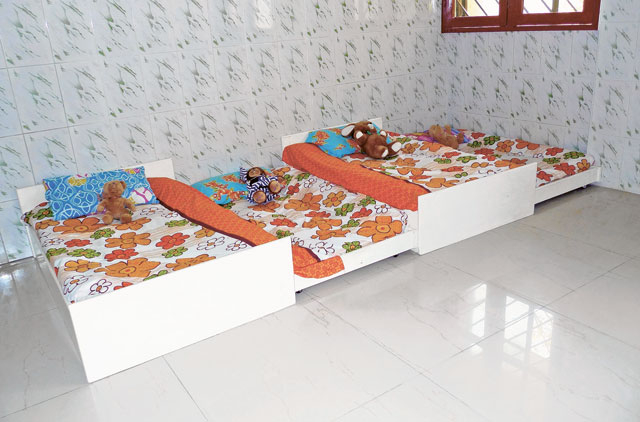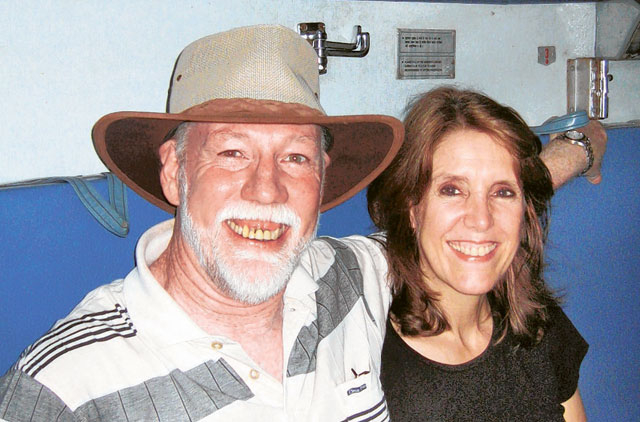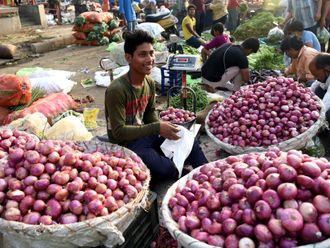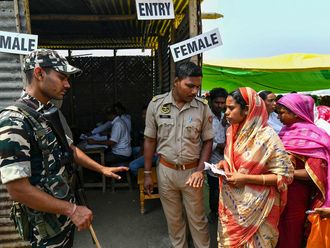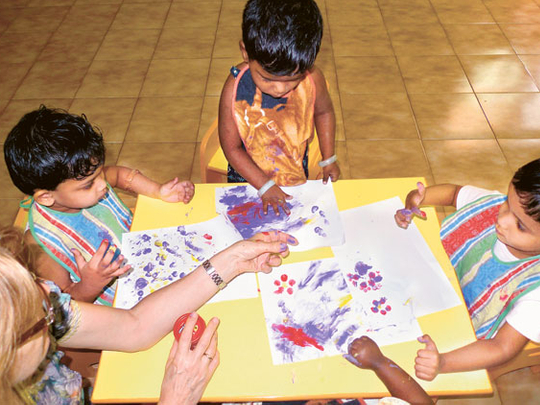
Alistair was born with severe cleft lip and palate. When he was only a few weeks old his parents left him at Mercy Home. Alistair grew up there with several other children, all abandoned by their parents — some on account of their gender, others for being born with a handicap.
Thanks to kind donors, Alistair's cleft lip and palate were surgically corrected. And not only was he beginning to speak, he also started learning to read and write at the pre-school inside Mercy Home.
Call it a miracle, when four years later, his parents after reading about their son's improved condition, in a daily, arrived at Mercy Home. They wanted their son back. Today, Alistair is the apple of his parents' eye.
For Sulekha, being born a girl was reason enough to be dumped. On top of that, she was born without a femur bone on her right leg. Her parents chose to abandon her at Mercy Home. Last December an Indian couple adopted her.
Living up to its name is this home located 25 kilometres west of Madurai in Tamil Nadu. Founded in 1987 by the Claretian Missionary Fathers, its aim was to provide a sanctuary to babies rescued from the clutches of female infanticide that was rampant around Madurai.
Working in association with local authorities and hospitals, the home has taken several babies that ceased to be a bundle of joy. Babies have been left outside the gates of the home and some were handed over by hospitals. Unwed mothers left their little ones here as did parents of handicapped children. Today, this home, a haven for little ones, is licensed for putting up children for adoption and follows government norms and legal standards.
Supporting the cause of Mercy Home is Relief Projects India (RPI), an NGO founded in 2007 by Jesse Tincher and Susanna Turcotte. It might interest readers to know that Turcotte is the mother of Bollywood star Katrina Kaif.
So how did an American couple find their way into the villages of Madurai?
Tincher, who hails from Kentucky, says, "Most of my adult life I have been involved in social work as a volunteer."
From being part of hurricane relief efforts in the United States to working with street children in Romania, Tincher has worked in orphanages in the Philippines and with Aids-affected families in Africa. The tsunami of 2005 brought him to Cuddalore, a coastal town in south India where he joined some of his friends involved in relief work. Meeting the Claretian Missionaries there, Tincher was impressed with their sincerity and dedication. "After visiting Mercy Home we became more aware of female infanticide in the area," says Turcotte, who has volunteered in the hurricane relief work in Texas. "We found our focus working with the problems related to female infanticide in the villages of Tamil Nadu."
So when the need for a generator arose at Mercy Home, Tincher and Turcotte mobilised funds. "Frequent power cuts caused heat rashes to the babies. The generator was the first step," she recalls.
Over the next 12 months, RPI arranged for new supplies, such as nappies, sheets, towels, toys and feeding bottles. A paediatric ICU was set up and the nursery area was renovated. The toddlers were moved from the nursery to a separate wing to give them better attention. Fondly known as Little Darlings, these toddlers now have a teacher and an aya with separate play area, classroom and bedroom.
"Katrina assisted with fundraising for some of our projects. She sponsored the ‘Little Darlings' wing and programme. This programme provides pre-school education and care to older babies. Most of them have some physical disability which prevents them from being adopted," Turcotte says.
RPI was officially registered in 2007. "We then collaborated with Mercy Home to initiate programmes in nearby villages to provide assistance to disadvantaged mothers and children and to prevent infanticide and foeticide amongst the villagers."
In 2008, RPI launched the SHE (Services, Health and Education) Awareness Programme. This aimed at improving the life and health of mothers and young girls, through monthly counselling programmes.
"We not only monitor their health, but also assist them in obtaining government benefits due to them, especially the physically challenged," Turcotte says.
Another initiative of RPI concerns teenage girls from villages. Through games and other activities, bimonthly awareness talks are conducted on hygiene, nutrition, female infanticide, education and Aids awareness.
"This programme has been effective," Turcotte says. "Through evening tuitions we have been able to help girls continue with their schooling, complete their education and strive for higher marks."
Another marked change that RPI brought about was in the three anganwadis (nursery schools) by arranging for teachers, and educational toys from local sponsors. "These schools set up by the government lacked supplies for the children. They just lay listlessly on the floor waiting for the mid-day meal. Today they enjoy songs, nursery rhymes, stories, early-learning flashcards, playing with blocks and puzzles and other early-learning activities.
The inevitable question: What about funds?
Most donations are from friends and relatives, some of whom have visited the home and villages.
"Fundraising is an ongoing effort," Tincher says. "All funds raised are deposited in the trust account and used explicitly for our social-work endeavours. We have board members, accountants and auditors who keep us advised on the use of funds, and our accounting is very transparent."
On the adoption procedure at Mercy Home, Turcotte says: "Adoptions are handled by the Mercy Home director and a social worker. RPI is not involved in this process."
Mercy Home doesn't have a licence for adoption abroad. All adoptions are done within India, more precisely in Tamil Nadu and approved by a special court. Mercy Home also conducts home studies of prospective parents and has a good follow-up programme to ensure that adopted children are well taken care of.
"More than 400 babies from Mercy Home have been adopted by good families. Presently there are more families applying to adopt a baby than there are babies available at the home. The programme is very successful. It is wonderful to see the adoptive parents return to visit the home. The babies are happy and well cared for by their new parents," Turcotte says.
Tincher adds: "The biggest hurdle, however, pertains to handicapped children of the home. They are not readily adopted, which is why we have set up schooling for them."
Coming up is a rural centre for conducting SHE and teenage programmes besides offering space for conducting tuitions for village children. On the anvil are plans for a permanent home for the Little Darlings and a free rural clinic.
As you hear the children addressing Tincher and Turcotte as thatha (grandpa) and patti (grandma) you begin to understand that this bond free of all blood ties was born out of compassion.
Mythily Ramachandran is an independent writer based in Chennai, India.


